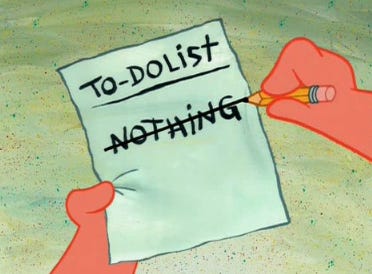I spent the day reading about English property law and organising my house. I then watched Demon Slayer for the second time. I then ate apple pie. Then I looked at bike routes for my trip to the Lake District. And now I’m writing this…
Pretty random. It’s a lot of consumption and not much ‘making’. I would’ve called this an ineffective day a few months ago.
This is because I used to measure actions based on a productivity factor that captured how much building was involved. I felt that consuming things was less productive than creating things. When I was younger, teachers categorised learning methods the same way, with reading at the bottom, and ‘learning by doing’ at the top.
This lead to a model of a hierarchy of actions:
Consuming non-literary content, like podcasts or videos, was at the very bottom of the effectiveness hierarchy.
Then it was reading about stuff.
Then it was creating things that were information based - writing or coding or theorising or problem solving on paper.
At the top it was doing things of material consequence - something that physically moved the world around me (making money, building something, doing a physical experiment, meeting people).
In the past, I’ve tried to stick to doing things of material consequence. Pushing the world around to do my kitchen experiments, or sharing my essays feels ‘strong’ and ‘useful’. I need to put some effort into it, so it’s effective, right?
Well, I don’t really buy into this anymore.
I realised that I’ve actually learnt a lot of DIY science stuff from YouTube. One of my the best ways I’ve kept up with British politics is listening to podcasts. Reading Russian literature has shaped my world view, and some books have genuinely helped me in the real world (read Dale Carnegie’s book on how to make friends). I’ve come across experiment ideas through reading endless papers in bed.
And sometimes, I just need a break from creating, and absorb instead.
Does this mean my framework was wrong? Maybe, but what I really think is bad is to cling to frameworks too early and with too much conviction. My brain is naturally drawn to creating frameworks. But effectiveness is a hard and complicated problem, and there was no real reason to think that my previous ‘productivity framework’ was better than doing random selections from a collection of possible actions.
Despite being a physicist that loves measuring things, sometimes I need to take a step back and appreciate the immeasurable. Task frameworks are really hard to measure because effectiveness is hard to measure. It’s also near impossible to do an ‘effectiveness’ experiment, where I design a productivity metric and then spend 1 week doing a certain thing, then another week doing the next, and comparing the two.
This is why I am trying to put less weight on frameworks, and more on ‘diversification by randomness’. A good prior is usually the uniformly random prior. So, when I’m unsure of what the best approach to being productive is, I just try to do an equal weighted amount of reading, doing, talking and listening. Do more random shit!
Or, I just do what I want at the moment. Which is more fun. And right now, that’s more chomping on more apple pie baby!!

Wow, these are some really important concepts and you described them so well. Novelty and variance in experience are so essential to finding new creative inspiration and excitement. And I also always recommend Dale Carnegie’s book on how to make friends.
Your hierarchy of actions feels painfully accurate even though I know in my heart of hearts that being productive relies as much on leisure time and non-directed exploration as it does on the grind. Thank you for sharing.